Written by Greg Long
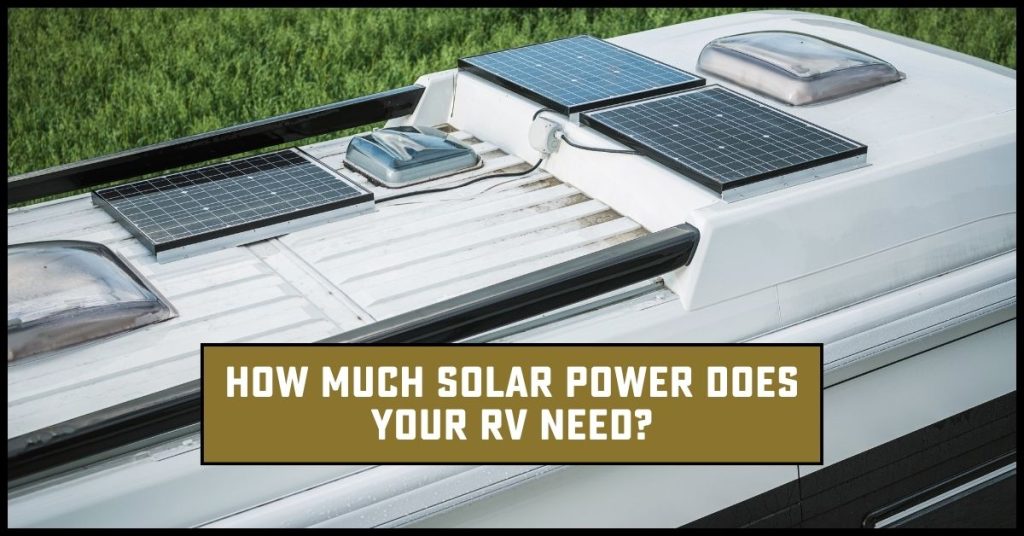
Picture this: You and your family load up the camper for a quick weekend getaway only to find yourself grappling with a frustrating lack of power.
Sure, the sun is shining brightly, but you’re left in the dark about how to harness its energy to fuel your camper’s appliances and gadgets.
It’s a feeling of helplessness and missed opportunities no traveler should have to go through.
If you don’t know much about solar energy, you’re not alone. In fact, questions about RV solar panels are some of the most frequently asked questions we get at Bish’s RV.
By the time you finish reading this solar power guide, you’ll have all the info you need to decide if solar power is a must-have option for your camper.
Let’s dive into RV solar panels and learn how you can use sunlight to brighten up your camping adventures.

Want to talk to a solar panel expert?
Our team of certified technicians is here to help!
What is RV Solar Power?
RV solar power refers to the use of solar panels installed on campers to generate electricity from the sun’s energy.
These solar panels are designed to capture sunlight and convert it into usable electrical power that can be used to charge batteries, run appliances, and provide energy for various functions within the RV.

The energy generated by the solar panels can be stored in batteries, allowing RV owners to have a sustainable and eco-friendly source of power even when they’re not connected to traditional electrical outlets.
RV solar power systems typically consist of solar panels mounted on the roof of the RV, a charge controller to regulate the energy flow, and a set of batteries to store the generated electricity.
How Does RV Solar Power Work?
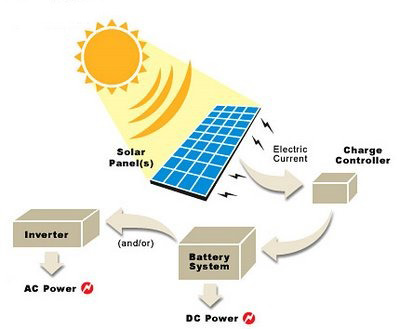
Solar Panels capture sunlight through photovoltaic cells, which create a flow of electrons to generate direct current (DC) electricity. The charge controller manages the flow of electricity from the panels to the batteries, preventing overcharging and ensuring efficient energy storage.
Why Choose Solar Power for Your RV
RV owners often choose to install solar power systems to increase their independence while traveling. With solar panels, you can reduce your reliance on traditional campsite hookups or generators, allowing you to enjoy off-grid camping and extended stays in remote locations.
Additionally, using solar power for your camper is environmentally friendly and reduces the carbon footprint associated with conventional power sources.

Solar Prepped vs Solar Installed: What’s the Difference?
Most newer RVs are “solar prepped“, which means the RV is equipped with the necessary wiring and connections to easily add solar panels.
This setup typically includes pre-installed wiring from the roof to the battery or a designated controller area, making it simpler to install a solar power system without needing extensive modifications.
However, many new campers today are “solar installed”, which means the RV is fully equipped to connect and use its installed solar panels right away.
Solar Prepped and Solar Installed Campers come in all sizes and layouts.
Check out availability and pricing now.
What’s a “Typical” RV Solar Panel Package and What Will it Power in My RV?
Before we get into all the details of the different kinds of solar panels and how to choose which are best for your camping needs, let’s answer the question we here at Bish’s RV get asked the most:
“What will most “typical” RV solar packages power in my RV?”
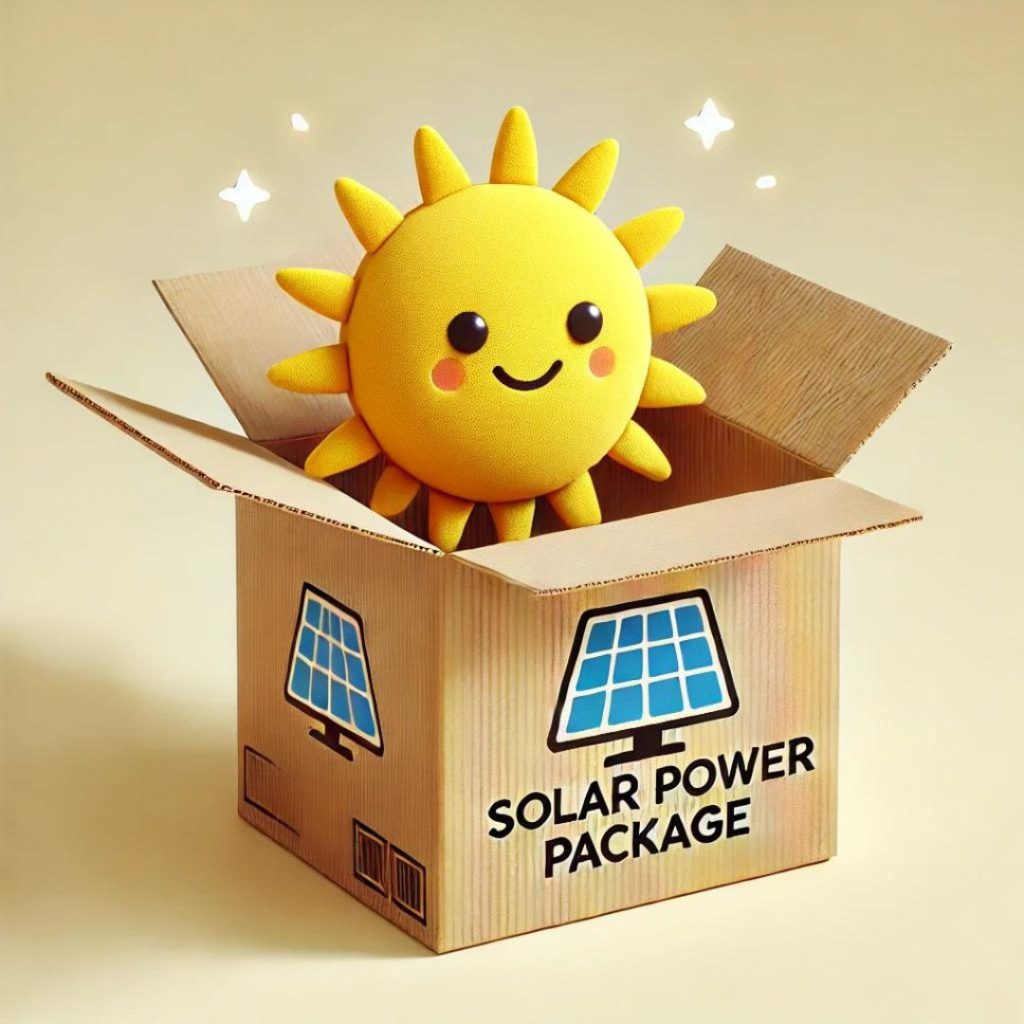
A typical solar panel package for RVs is designed to cater to the energy needs of most campers while keeping installation and maintenance as simple as possible.
So, what are the components of a typical RV solar Package? Keep reading to find out!
Components of a Typical RV Solar Panel Package:
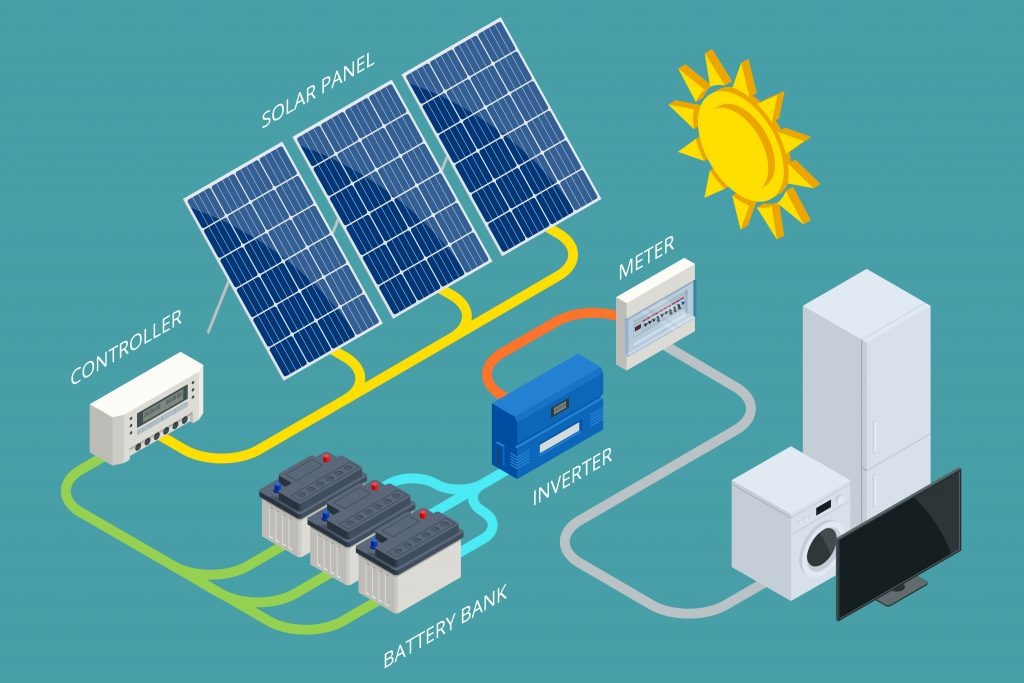
- Solar Panels: These convert sunlight into electricity. The most common types for RVs are monocrystalline or polycrystalline panels, although flexible solar panels are also gaining traction due to their ability to contour to the RV’s roof.
- Charge Controller: This manages the charge going into the RV’s batteries, ensuring they don’t overcharge. There are two main types: PWM (Pulse Width Modulation) and MPPT (Maximum Power Point Tracking), with MPPT being more efficient but often more expensive.
- Inverter: It converts DC (Direct Current) from the batteries into AC (Alternating Current), which is used by most appliances. There are pure sine wave inverters (ideal for sensitive electronics) and modified sine wave inverters.
- RV Batteries: Deep cycle batteries store the energy harvested by the solar panels. There are various types, including lead-acid, AGM (Absorbent Glass Mat), gel, and lithium-ion, with each having its own pros and cons.
- Mounting Hardware: This includes brackets, mounts, and clamps to securely attach solar panels to the RV’s roof.
- Wiring and Connectors: Necessary to connect all the components together. Some kits might also include fuses and a breaker for safety.
- Monitoring System: Many setups come with a monitor or display that lets you keep an eye on the system’s performance and the state of battery charge.
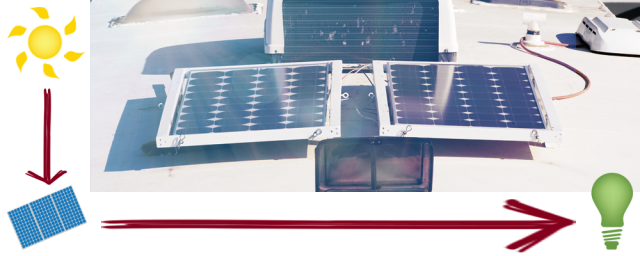
What Will Typical RV Solar Panel Packages Power in My RV?
The capacity of your solar panel setup and the energy storage dictate what you can power in your RV. Here’s what a typical setup can handle:
- Basic Solar Panel Setup (100W-200W):
- Lights
- Charging phones and laptops
- Running a radio or small TV for a few hours
- Intermediate Solar Panel Setup (200W-400W):
- All of the above, plus:
- Fans
- Refrigerator (12V)
- Water pump
- More extended TV use
- Advanced Solar Panel Setup (400W and above):
- All of the above, plus:
- Microwave (limited use)
- Coffee maker
- Small air conditioning units or heaters (very limited use)
However, always remember the actual power usage depends on the efficiency and consumption of each appliance, the number of sunlight hours you get, and the battery’s storage capacity.
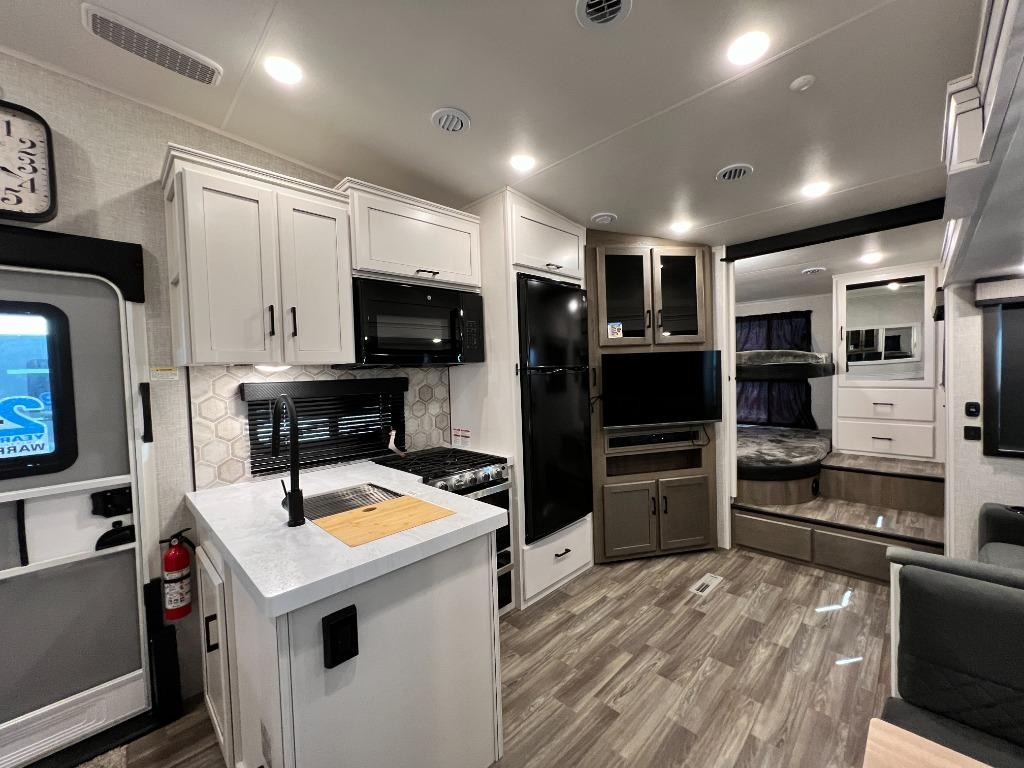
It’s advisable to calculate your estimated power usage and then choose a solar panel package that can meet or exceed those needs.
And always have a backup power source (like a generator) for those cloudy days or when higher power appliances are needed for extended periods.
Types of RV Solar Panels
When it comes to unleashing the power of the sun for your RV adventures, understanding the differences between the different types of RV solar panels is a crucial first step.
These panels come in various forms, each with its own set of advantages and considerations. From monocrystalline to polycrystalline, thin-film to flexible panels, there’s a wide-range of solar power options to suit your specific needs.
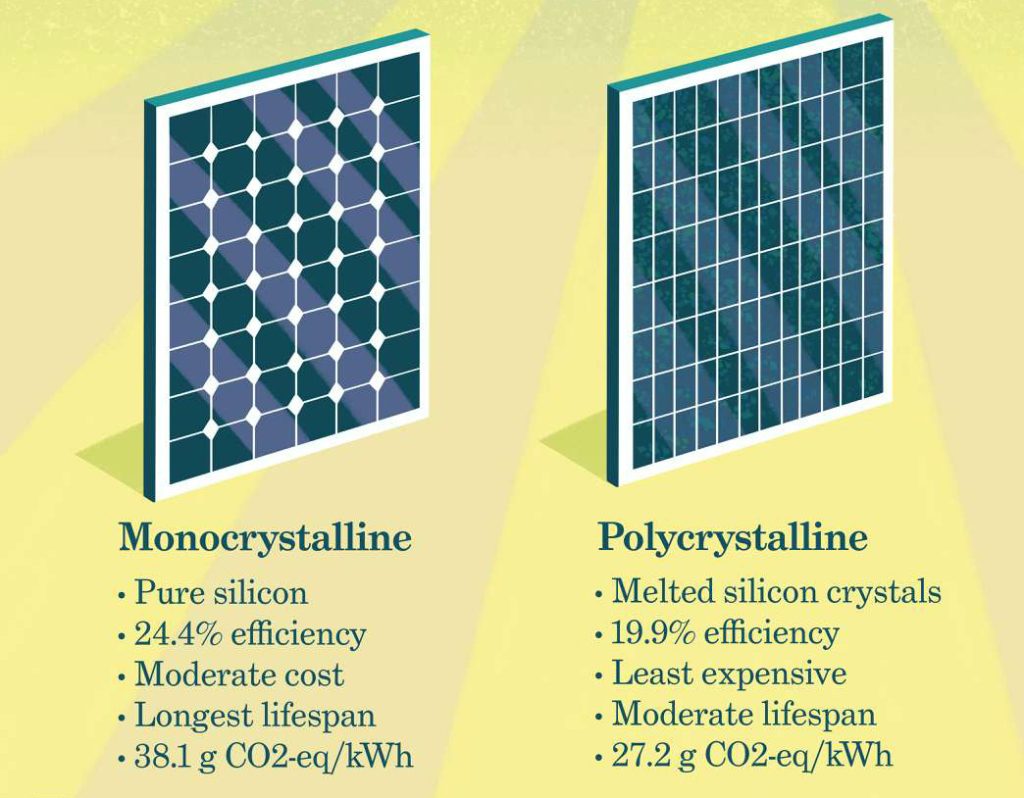
Monocrystalline Solar Panels
When selecting the ideal solar panel for your camper, monocrystalline solar panels stand out as a popular and super-efficient choice. These panels are crafted from a single crystal structure, making them highly efficient in converting sunlight into usable electricity.
The distinctive black hue of monocrystalline panels not only lends a sleek appearance to your RV’s roof but also indicates their superior energy-capturing capabilities.
Monocrystalline Solar Panels Pros and Cons
Monocrystalline Solar Panels Pros:
- High Efficiency: Monocrystalline panels are known for their exceptional efficiency rates. The uniform crystal structure allows them to convert a larger portion of sunlight into electricity, making them an excellent option for RVers seeking maximum power output.
- Space Efficiency: Due to their high efficiency, monocrystalline panels require less space to generate the same amount of power as other panel types. This is particularly beneficial for RVs with limited roof space.
- Longevity: Monocrystalline panels are also renowned for their durability and longevity. Their solid construction and resistance to temperature fluctuations contribute to a longer lifespan, ensuring you get the most out of your investment.
- Performance in Low Light: These panels perform well even under overcast skies or low-light conditions. This makes them suitable for varying weather conditions and ensures a consistent power supply during your travels.
Monocrystalline Solar Panels Cons:
While monocrystalline panels offer numerous advantages, it’s important to keep a few considerations in mind:
- Cost: Monocrystalline panels are typically more expensive upfront compared to other panel types. However, their efficiency and long-term benefits often justify the initial investment.
- Aesthetics: The sleek appearance of monocrystalline panels may be appealing to some RV owners, but their black color could potentially impact the aesthetics of your RV’s roof.
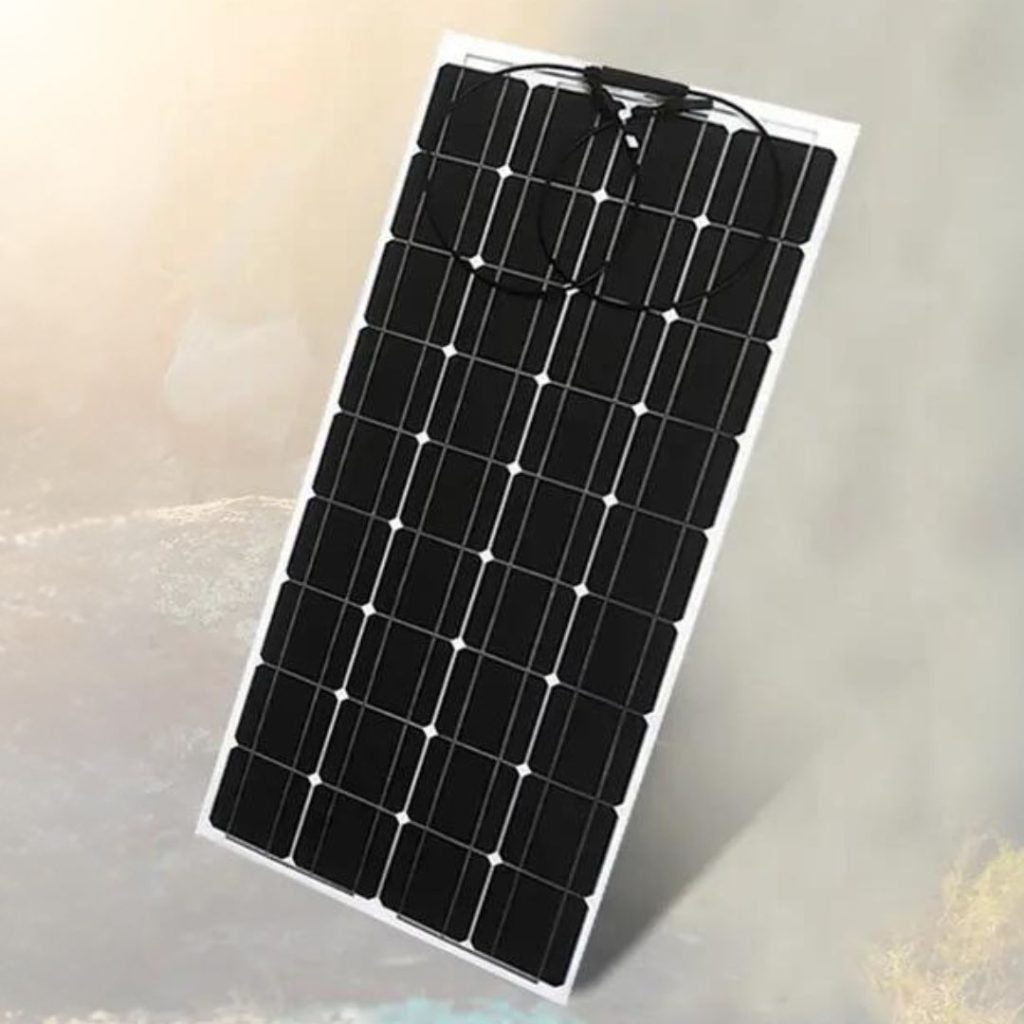
Monocrystalline solar panels present a compelling option for RV owners seeking top-tier efficiency and longevity.
While the initial cost may be higher, the benefits they bring to your energy independence and sustainable travels can make them a worthwhile addition to your RV setup.
Polycrystalline Solar Panels
When exploring solar panel options for your RV, you’ll likely encounter polycrystalline solar panels as an attractive alternative to monocrystalline panels. These panels are crafted from multiple silicon crystals, which contribute to their distinct blue appearance.
Polycrystalline panels offer a balance between efficiency and affordability, making them a popular choice for RVers seeking reliable solar power solutions.
Polycrystalline Solar Panels Pros and Cons
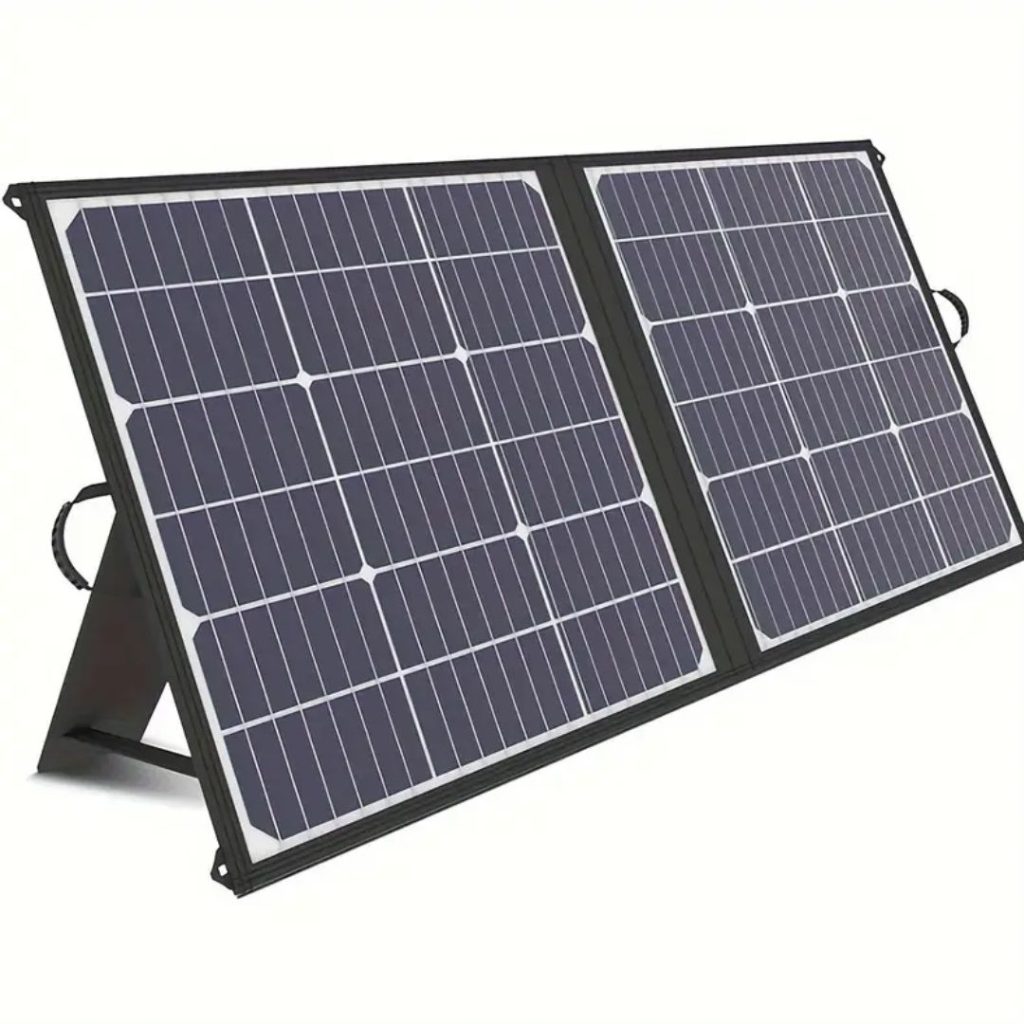
Polycrystalline Solar Panel Pros:
- Cost-Effective: Polycrystalline panels are often more budget-friendly compared to monocrystalline panels. This makes them an excellent choice for value-minded people looking to harness solar power without breaking the bank.
- Decent Efficiency: While slightly less efficient than monocrystalline panels, polycrystalline panels still offer commendable energy conversion rates. They can generate ample electricity to power your camper’s essential appliances and devices.
- Adaptability: Polycrystalline panels perform well in various light conditions, ensuring consistent power generation even on cloudy days. This adaptability makes them a reliable energy source for your nomadic lifestyle.
Polycrystalline Solar Panels Cons:
As you consider polycrystalline solar panels for your RV, keep the following points in mind:
- Size and Space: Polycrystalline panels are generally larger in size compared to monocrystalline panels with the same wattage. Ensure your RV’s roof has adequate space to accommodate the size of the panels you intend to install.
- Efficiency: While efficient, polycrystalline panels have a slightly lower energy conversion rate compared to monocrystalline panels. This means you might need a larger panel array to generate the same amount of power.
- Aesthetics: Some RV owners may prefer the sleek look of monocrystalline panels over the blue hue of polycrystalline panels. Consider your aesthetic preferences when choosing the panel type for your RV
Polycrystalline Solar Panels – an economical solar option
Polycrystalline solar panels offer a practical and economical option for RVers seeking to harness the power of the sun. Their balance between cost and efficiency makes them a sensible choice for powering your camper’s appliances and devices.
While they might not be as space-efficient or have the same high efficiency as monocrystalline panels, polycrystalline panels provide a reliable and budget-conscious solution for embracing solar energy during your travels.
Rigid Solar Panels vs Flexible Solar Panels
When you start investigating the different types of solar panels for RVs, you will notice that some are described as “rigid” and others as “flexible.” Knowing how a solar panel’s rigidness affects where you can place the panel on our camper will help you decide what type of solar panels you need for your RV.
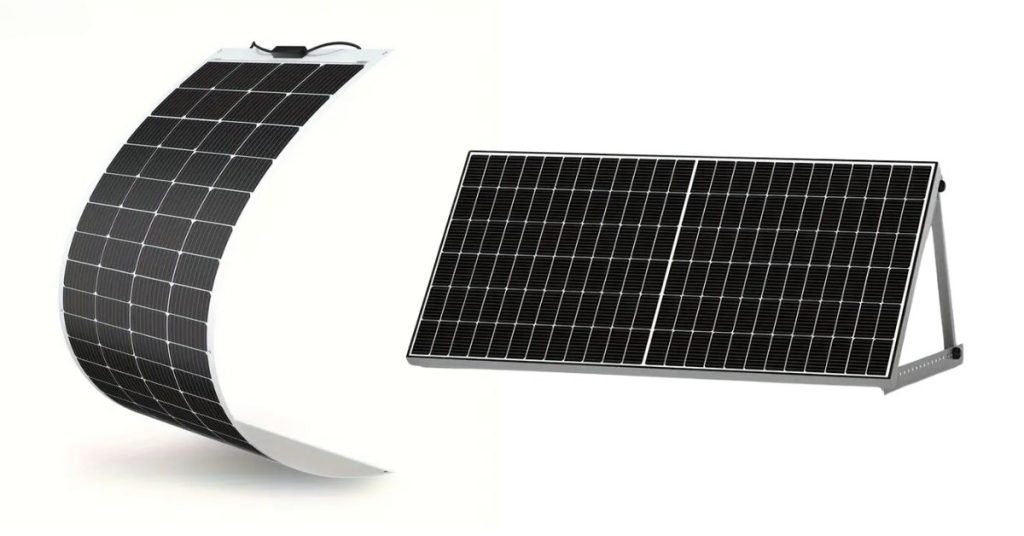
Rigid and flexible solar panels differ primarily in their construction, applications, and adaptability to different surfaces.
The 4 Main Differences Between Rigid and Flexible Solar Panels
1. Construction and Adaptability:
- Rigid Solar Panels for RVs: Rigid panels are built with a solid frame and protective glass cover, making them durable and suitable for stationary installations. They are commonly mounted on the flat roof of an RV, ensuring stability and optimal energy production.
- Flexible Solar Panels for RVs: Flexible panels, designed to bend and conform, are perfect for curved RV surfaces. Their lightweight design allows them to adapt to the contours of your RV’s roof, enabling more versatile installation options.
2. Applications on RVs:
- Rigid Solar Panels for RVs: Rigid panels are favored when stability and maximum energy efficiency are priorities. They perform exceptionally well on the flat surface of an RV’s roof, providing reliable power output for your onboard appliances and devices.
- Flexible Solar Panels for RVs: Flexible panels are ideal for RVs with curved or irregular roofs. They offer the flexibility needed to adhere to the shape of your RV’s surface, enabling efficient energy generation even on non-traditional roof designs.
3. Weight Considerations:
- Rigid Solar Panels for RVs: Due to their solid structure, rigid panels are heavier. This weight might impact your RV’s load capacity, so it’s important to account for this when installing multiple panels.
- Flexible Solar Panels for RVs: Flexible panels are lightweight, making them a suitable choice for RVs where weight distribution is a concern. Their lighter design can also be advantageous when adhering to curved surfaces.
4. Efficiency and Performance:
- Rigid Solar Panels for RVs: Rigid panels, especially monocrystalline or polycrystalline types, offer higher efficiency. When installed on a flat RV roof, they can generate optimal energy output, helping to keep your batteries charged and appliances running.
- Flexible Solar Panels for RVs: While flexible panels are generally less efficient compared to rigid panels, advancements in technology have improved their performance. They are an excellent option for curved RV roofs where rigid panels might not fit as seamlessly.
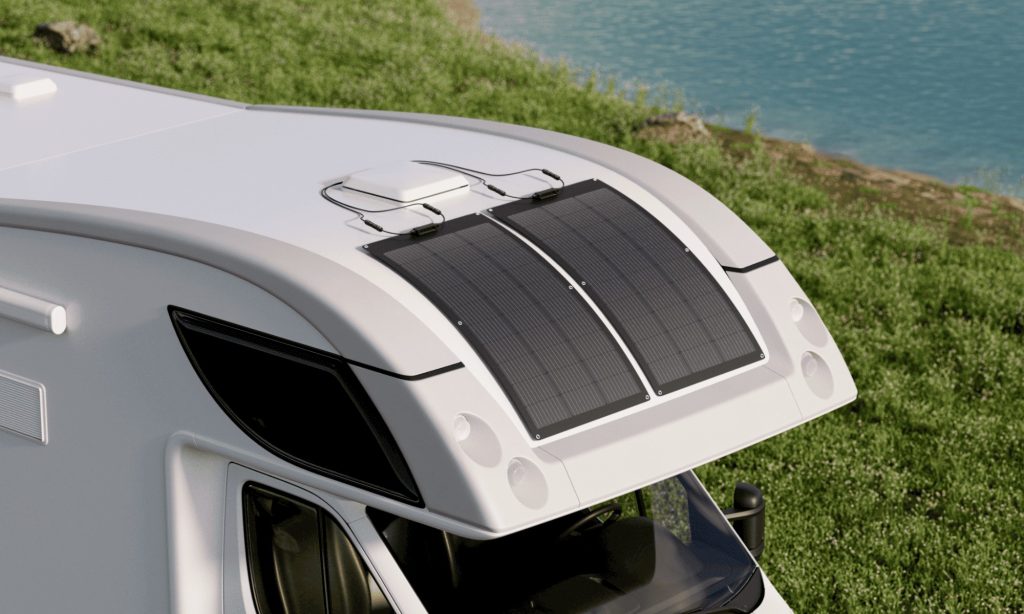
Which Solar Panel is Better – Rigid or Flexible?
Choosing between rigid and flexible solar panels for your RV depends on your specific needs. Rigid panels excel on flat surfaces, offering higher efficiency and reliability. On the other hand, flexible panels provide adaptability to curved and irregular RV roofs, expanding your solar power possibilities.
Understanding how these differences impact your camper’s performance will help you make a smart purchasing decision that suits your camper’s design and energy requirements.
Next Steps in Finding Your Perfect RV Solar Panel Set Up
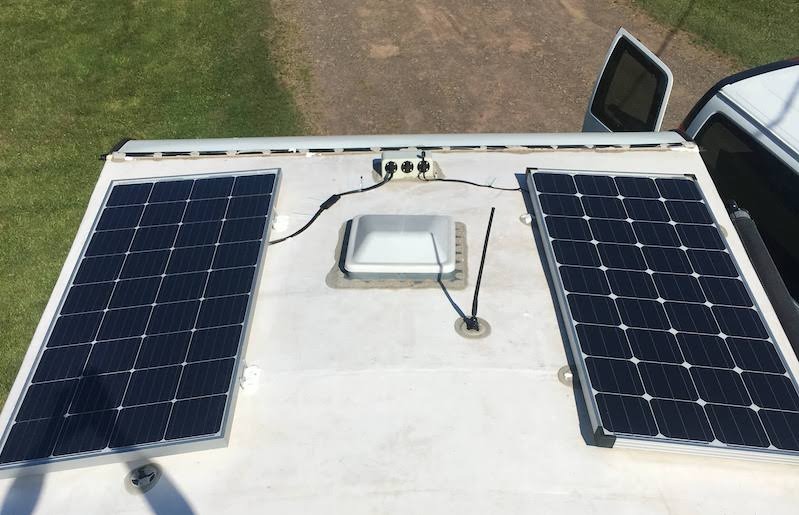
When you first saw all the different solar panel types and wattages, you may have felt lost or overwhelmed.
There’s a lot to learn!
However, with the insights and details provided in this guide, you now have a clearer understanding of solar panels and how they can be a game-changer for your RV adventures.
Remember, while this guide offers a lot of detailed information, there’s always more to explore and understand. That’s where Bish’s RV comes into the picture.
Our team of certified RV technicians is always on standby, happy to answer any remaining questions about solar panels you might have.
Buttons
Solar Prepped and Solar Installed Campers come in all sizes and layouts.
Check out availability and pricing now.
Want to talk to a solar panel expert?
Our expert team of certified technicians can help!
Solar Ready RVs!
Want to see some “Solar Installed RVs? Check out these videos from Josh the RV Nerd.
Articles to Expand Your RV Knowledge
- We Reviewed Over 50 Travel Trailers for 2025—These 10 Actually Stood Out

- The 2025 RV is Newer—So Why Is the 2024 Camper a Better Deal?
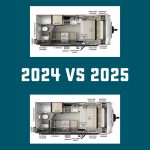
- 6 Nasty Surprises If You Don’t Get Your RV Ready for Spring

- Five RV Tech Upgrades to Improve Your Camping Trips
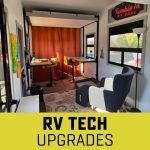
- Brinkley Model I 294 Review: Best Family Travel Trailer with Enclosed Bunkroom & Luxury Features


Greg Long
Bish’s RV Content Manager
Amateur adventurer; professional dreamer.
aka: The Bish-Blog-Guy


